 |
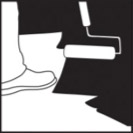 Seal the Deal
Seal the Deal
ChemMasters Newsletter: Vol 1 Issue 5
Choosing A Sealer That's Right For You
Choosing the right sealer seems simple enough… just ask which one is the best… right? That's the question every manufacturer hates to hear, because "best" is a relative term and there's no one product that is best for all people and all applications. In order to make a product recommendation, there are a few questions to ask:
What type of concrete finish do you have? Concrete generally has four different types of finishes; broom finished, smooth troweled, stamped, and exposed aggregate. Concrete pavers can be considered a fifth finish. Each of those finish types has unique considerations when choosing a sealer:
Film Forming Sealers vs. Penetrating Water Repellants
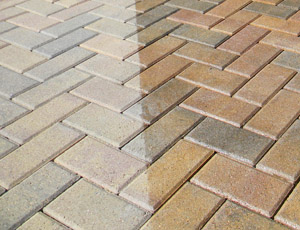
Film formers darken concrete, develop color and appear glossy.
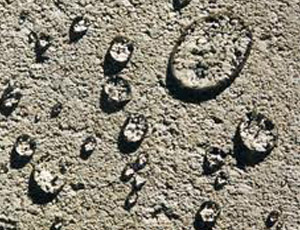
Penetrating water repellants prevent water absorption, protect against freeze/thaw damage, and do not change the appearance of concrete.
Film forming sealers come in two varieties; water-based and solvent-based. Both have different performance and aesthetic qualities:
Water-Based Sealers
- Low Gloss
- Minimal darkening of concrete
- Increased Chemical Resistance
Solvent-Based Sealers
- High Gloss
- Darkens concrete
- Increased color development
On the other hand, penetrating water repellants will protect your concrete from water intrusion, deicing chemicals and freeze/thaw damage, but leave the appearance unchanged and provide little to no protection from staining.
Film forming sealers are often recommended for:
- Stamped Concrete
- Exposed Aggregate
- Broom Finished Concrete
- Some Pavers
Penetrating water repellants are often recommended for:
- Smooth Troweled Concrete
- Broom Finished Concrete
- Natural or Manmade Stone
- Pavers
Service Environment
Is your concrete around a pool deck which might favor a penetrating sealer? Or surrounded by large trees, under the table and grill and in need of stain protection provided by film forming sealers? Always consider what elements and contaminants your concrete will be exposed to.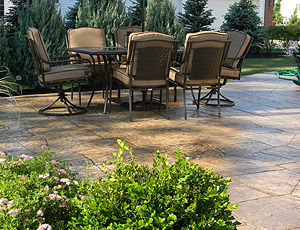
Tree sap, fertilizer, food and beverage spills can all stain unsealed concrete.
- Stain Protection
- Modest Chemical Protection
- Freeze/Thaw Protection
- Prevention of Water & Salt Absorption
Tip: Use Slip Stop additive in film forming sealers for applications around pool decks and other potential slip & fall environments.
Penetrating water repellants are often recommended for:
- Freeze/Thaw Protection
- Prevention of Water & Salt Absorption
Appearance
There are many elements that impact appearance, including darkening of concrete, color development of colored concrete, gloss level, penetration, etc. In each case, solvent-based film forming sealers will do so more than water-based versions, while penetrating water-repellants will generally not change the cosmetic appearance at all.Film forming sealers are often recommended for:
- Stamped Concrete
- Exposed Aggregate
- Broom Finished Concrete
- Some Pavers
Penetrating water repellants are often recommended for:
- Smooth Troweled Concrete
- Broom Finished Concrete
- Natural or Manmade Stone
- Some Pavers
Light Stability
All sealers do not have the same stability when exposed to UV sunlight. Some sealers may turn yellow or brown from prolonged exposure to sunlight.- Most penetrating water repellants are UV stable.
- Only film forming sealers made with UV stable resins are truly non-yellowing. Others are blended with UV absorbers which only delay the onset of yellowing.
Color Development
Some versions of stained or colored concrete may look dull and dusty prior to application of the right sealer. At other times it's preferable to maintain the original appearance of a substrate.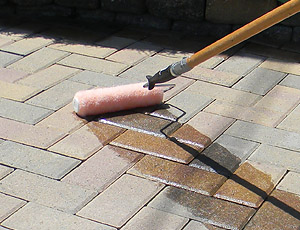
Solvent-based film forming sealers enhance color development.
- Smooth Troweled Concrete
- Broom Finished Concrete
- Natural or Manmade Stone
- Some Pavers
Solvent-based film forming sealers can darken the appearance of concrete, enhance color development, develop a high gloss "wet look" appearance, and wet out antiquing release agents. As a result, film forming sealers are often recommended for:
- Stamped Concrete
- Exposed Aggregate
- Broom Finished Concrete
- Some Pavers
Having some expectations about what you want your concrete to look like and what you want it protected from will better enable you to choose a sealer you'll be happy with today and for years to come.
Examples of ChemMasters Penetrating Sealers:
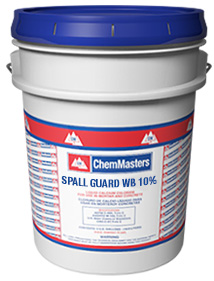 SpallGuard WB 10
SpallGuard WB 10
Penetrating Siloxane Low-VOC Water-Based Concrete
Sealer & Waterproofer
SpallGuard WB 10 is a penetrating, chemically reactive, solvent-free, silane modified siloxan emulsion designed to be a moisture and water repellant for concrete and masonry.
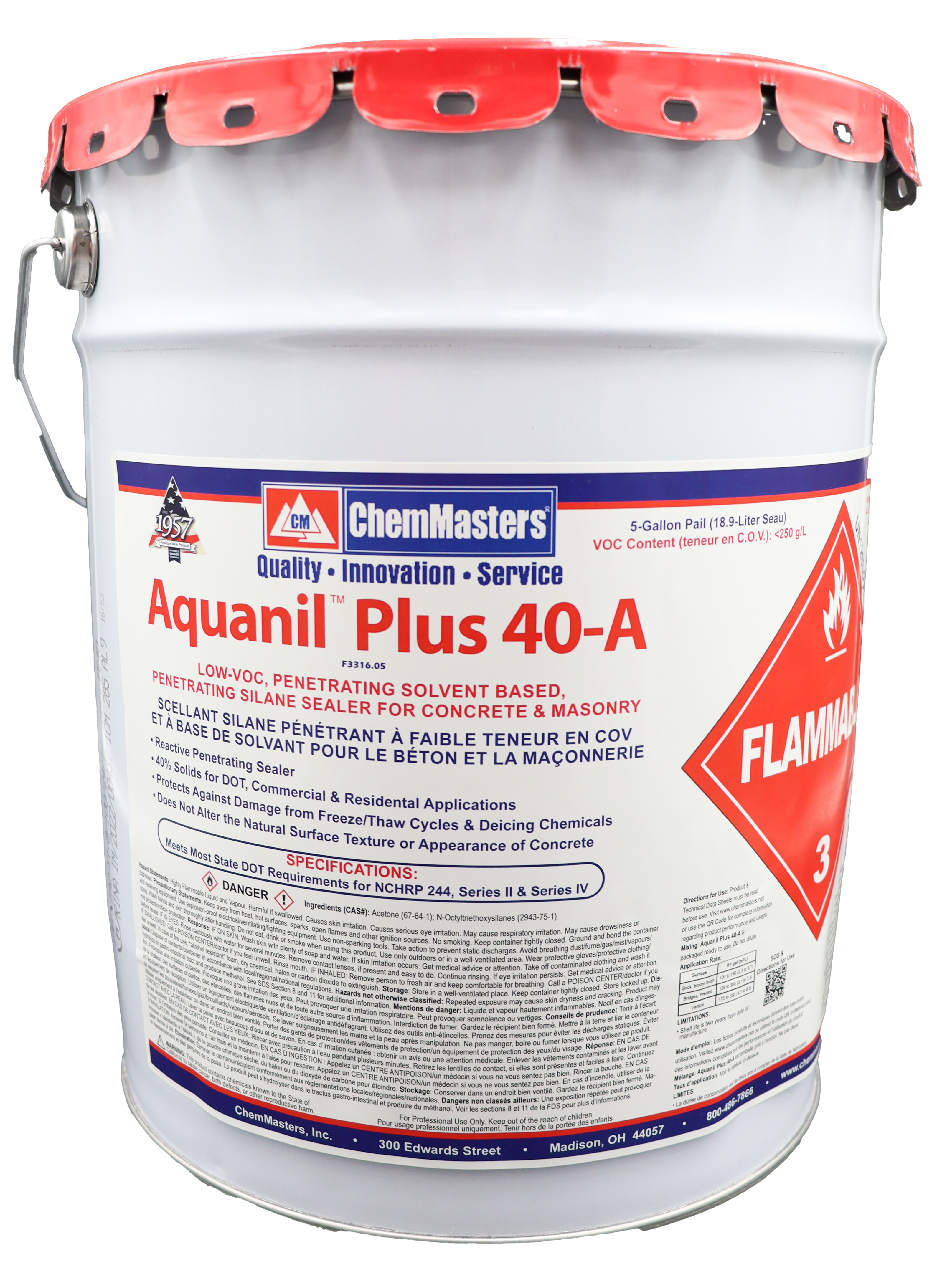 Aquanil Plus 40-A
Aquanil Plus 40-A
Low VOC Solvent-Based, Penetrating Silane Sealer
Aquanil Plus 40-A is a penetrating, chemically reactive
alkyltrialkoxy, 40% solids, solvent based silane sealer that
repels moisture and water from concrete and masonry.
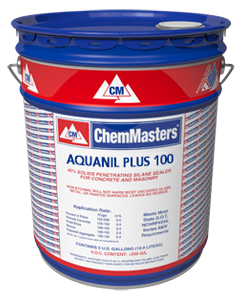 Aquanil Plus 100
Aquanil Plus 100
Penetrating Silane Sealer for Concrete and Masonry
Aquanil Plus 40-A is a penetrating, chemically reactive
alkyltrialkoxy, 40% solids, solvent based silane sealer that
repels moisture and water from concrete and masonry.
Examples of ChemMasters Solvent-Based Film Forming Sealers:
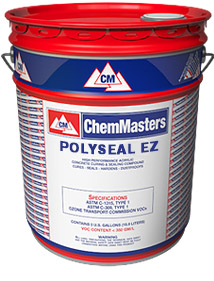 Polyseal™ EZ
Polyseal™ EZ
Bubble Resistant Low-VOC Cure and Seal
Polyseal EZ is a proprietary formulation that resists bubble formation, cobwebbing, and stringing commonly associated with low-VOC cure and seals.
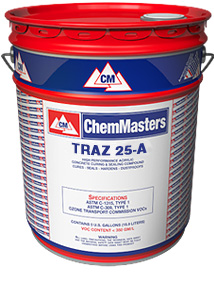 TRAZ™ 25-A
TRAZ™ 25-A
Low-VOC Solvent-Based Methyl-Methacrylate Concrete Sealer
Traz 25-A is a film forming sealer for concrete
and masonry. Traz 25-A is formulated with methyl
methacrylate polymers that develop high
gloss and are more chemical resistant than standard
acrylic sealers.
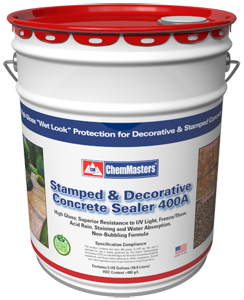 Stamped & Decorative Concrete Sealer 400A
Stamped & Decorative Concrete Sealer 400A
Slow Evaporating, Low-VOC High Gloss “Wet Look” Sealer
Film forming sealer manufactured to provide 200-300% more working time on stamped, exposed aggregate, and other decorative concrete than traditional low-VOC sealers.
Examples of ChemMasters Water-Based Film Forming Sealers:
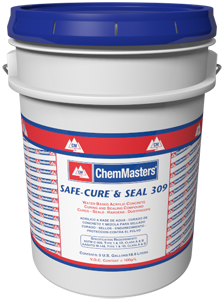 Safe Cure® & Seal 309
Safe Cure® & Seal 309
Economical Indoor Concrete Cure and Seal
Safe-Cure® & Seal 309 is a water emulsion, styrene acrylate
copolymer curing and sealing compound for concrete.
Safe-Cure® & Seal 309 is low-odor product that produces a
medium gloss film.
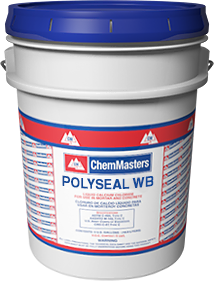 PolySeal™ WB
PolySeal™ WB
Pure Acrylic Non-Yellowing Cure and Seal
Polyseal WB is a high solids, water-based, non yellowing, acrylic concrete curing and sealing compound. This state-of-the-art proprietary formulation forms a tough acrylic film to effectively cure fresh concrete and protect older concrete.
Silencure, Polyseal, Traz, Aquanil, Spall Guard, Chemisil, EZ Strip Cure, SafeSeal, Spray Film, DuraShield SRT, Slip Stop and Exposee are trademarks of ChemMasters, Inc. ChemMasters and Safe-Cure are registered trademarks of ChemMasters, Inc.
300 Edwards Street, Madison, Ohio 44057
Phone 440.428.2105 - 800.486.7866
Fax 440.428.7091
Silencure, Polyseal, Traz, Aquanil, Spall Guard, Chemisil, EZ Strip Cure, SafeSeal, Spray Film, DuraShield SRT, Slip Stop and Exposee are trademarks of ChemMasters, Inc. ChemMasters and Safe-Cure are registered trademarks of ChemMasters, Inc.

Phone 440.428.2105 - 800.486.7866
Fax 440.428.7091
ERISA Documents for Welfare Benefit Plan
